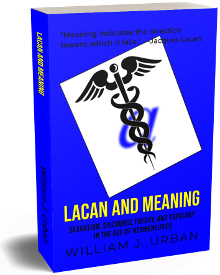LACAN AND MEANING
SEXUATION, DISCOURSE THEORY, AND TOPOLOGY IN THE AGE OF HERMENEUTICS
CHAPTER 1
PETITIONS TO MEANING
Every where the greater joy is ushered in by the greater pain. What means this, O Lord my God...? What means this, that this portion of things thus ebbs and flows alternately displeased and reconciled?... Woe is me!
But let me be united in Thee, O Lord, with those and delight myself in Thee, with them that feed on Thy truth, in the largeness of charity, and let us approach together unto the words of Thy book, and seek in them for Thy meaning, through the meaning of Thy servant, by whose pen Thou hast dispensed them.
—Saint Augustine
The subject always has the option of appealing to authority whenever confronted by troubling phenomena. And when it comes to the big questions, it appears that only the biggest authorities will do. An exemplary case is had with the Confessions where St Augustine repeatedly aims his soul-searching questions at the authority of all authorities: God. This is as one might expect of a text written just prior to the fall of Rome in an age where, for centuries to come, the religious sphere will attract the greatest share of earnest supplicants. What must not be overlooked, however, is how this text is rather unique in having made direct appeals to God during a time when the vast majority did so through an authoritative intermediary: the Roman Catholic Church. The activity of this earthly institution effectively filled a need for a Heavenly response and throughout the medieval period it exercised monopolistic control over how His Word should be understood – that is, until the Reformation suddenly tabled a new option. For the first time it was now widely acceptable to sidestep all intermediaries in the quest for the truthful meaning of Scripture. As will be seen in the final chapter, Lacan’s work on hysterical discourse nearly sixteen hundred years later demonstrates that such impassioned pleas cannot result in any deep insight, for the appealing subject is shown to be thoroughly barred from that object of meaning which comes to occupy the place of truth. Yet far from being an activity of the distant past, authoritative appeals are still being made today under various guises. In this initial chapter we examine some theories of meaning which closely cling to their religious origins, the most consequential of which is hermeneutical phenomenology with its supplication to the meaning of being.
next »full text of Lacan and Meaning
FREE Lacanian-themed puzzles

